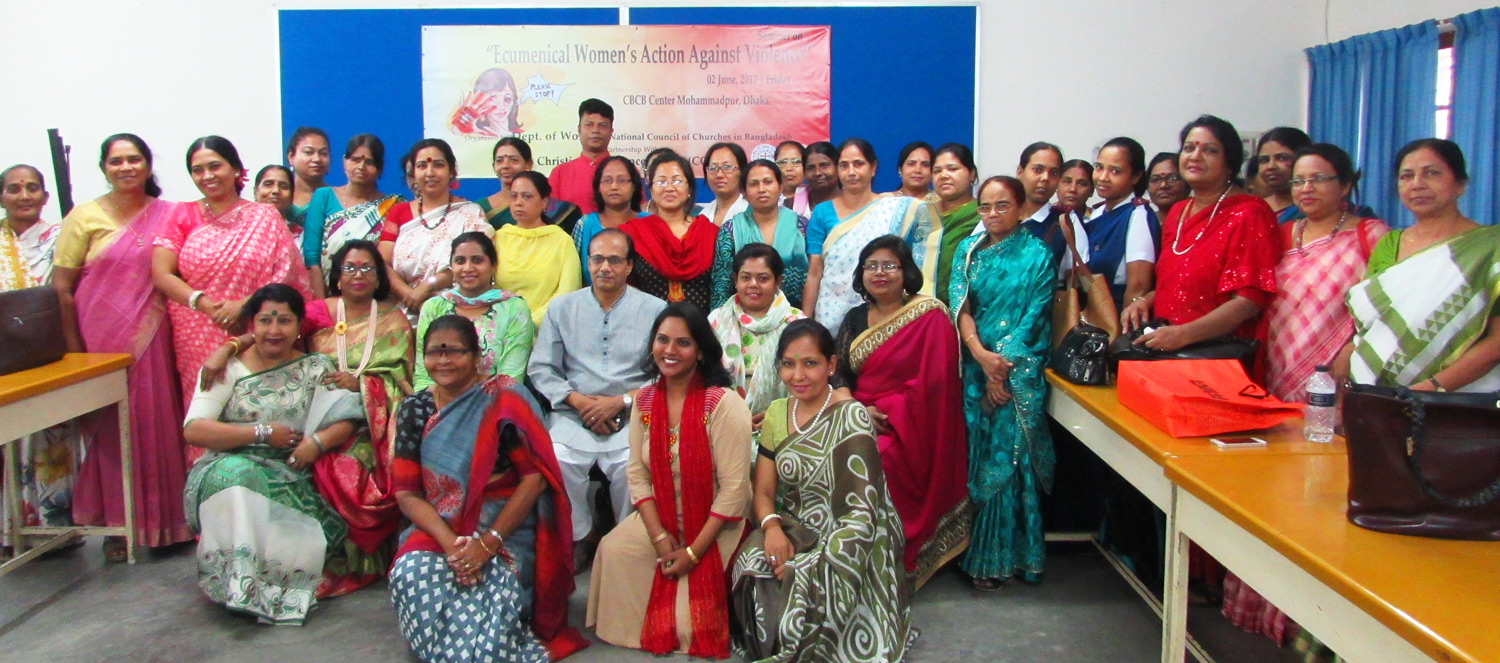Ecumenical women’s gathering demands end to gender-based violence in Bangladesh
 Participants of the national ecumenical women’s consultation in Dhaka, Bangladesh.
Participants of the national ecumenical women’s consultation in Dhaka, Bangladesh.
“Bangladeshi women are subjected to violence throughout their lives, which prevents them from realising their own dignity and rights as human beings. This subjugation in the day-to-day lives of millions of women in poverty stricken Bangladesh affects their abilities to fully benefit from and participate in schooling and employment, thus constraining their lifespan opportunities,” shared the participants of a Christian Conference of Asia (CCA) Consultation held in Dhaka, Bangladesh on 2-3 June 2017.
“Violence against women in the country is deeply rooted in a historical, social and political context, where governmental structures, social institutions and the law may all contribute to its persistence. The wide range of violence against women in Bangladesh includes intimate partner violence, domestic violence, child abuse, sexual harassment, child marriages, human trafficking, female child mortality, honour killings, and dowry-related violence among others,” the participants observed.
The participants of the consultation demanded strong law enforcement mechanisms to end gender-based violence in the country.
“Many governmental policies and services continue to reflect a gender bias. Despite having legal protection against several forms of violence, legal systems struggle to overcome barriers that obstruct reform. They also have to contend with significant structural deficiencies that prevent women from accessing justice. Religious institutions and norms too, reinforce unequal gender relations and contribute to violence against women,” the group of church women further added.
Organised by the CCA, in collaboration with the National Council of Churches Bangladesh (NCCB), the national ecumenical women’s consultation ‘Combating Violence Against Women’ brought together a group of 56 women from various churches and ecumenical organisations in the country.
The national consultation was part of the new programme initiative of the CCA, ‘Ecumenical Women’s Action against Violence’ (EWAV) which encourages churches to support ecumenical women’s initiatives for empowerment and prevention of violence against women.
Coordinator of CCA’s EWAV programme, Mrs. Sunila Ammar, who facilitated the consultation stated that, “interactions with various church women groups in Bangladesh and the women’s committee of the NCCB, as well as representatives from CCA member churches – Bangladesh Baptist Church Sangha and the Church of Bangladesh were encouraging as they were appreciative of the new ecumenical initiative EWAV and showed a keen interest to work collectively to combat violence against women.”
“There cannot be peace in Asia as long as there is violence against women. Feminism is an ideology and has nothing to do with biology. There are many men around the world who are working for women’s rights,” Mrs. Sunila Ammar added.
The consultation also emphasised upon the Sustainable Development Goals (SDGs) which aim to achieve gender equality and women empowerment, and urged church leaders to be aware of the commitment made by governments to advocate the empowerment of women at all levels.
The participants of the consultation re-read sections on feminist theology in their local contexts. They collectively pledged to create awareness on SDGs, and international and national mechanism for women empowerment and prevention of violence against women.
EWAV, an Asian ecumenical network of women aimed at advocacy on violence against women, was launched in 2016.
The Dhaka consultation was a follow-up to strengthen the ecumenical initiative of church women against violence, with an aim to enhance the capacities of church women engaged in advocacy through grassroots women’s networks.











